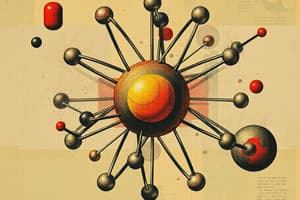Podcast
Questions and Answers
What are the building blocks of matter?
What are the building blocks of matter?
- Compounds
- Molecules
- Atoms (correct)
- Chemical bonds
What type of chemical bond is formed by the transfer of electrons?
What type of chemical bond is formed by the transfer of electrons?
- Chemical reaction
- Molecular bond
- Covalent bond
- Ionic bond (correct)
What is the notation that indicates the types and numbers of atoms in a molecule?
What is the notation that indicates the types and numbers of atoms in a molecule?
- Empirical formula
- Structural formula
- Chemical notation
- Molecular formula (correct)
What is the temperature at which a substance changes from solid to liquid?
What is the temperature at which a substance changes from solid to liquid?
What is the ability of a substance to undergo chemical reactions?
What is the ability of a substance to undergo chemical reactions?
What type of formula shows the arrangement of atoms in a molecule?
What type of formula shows the arrangement of atoms in a molecule?
Flashcards are hidden until you start studying
Study Notes
Atomic Combinations
Types of Atomic Combinations
- Atoms: The building blocks of matter, consisting of protons, neutrons, and electrons.
- Molecules: Two or more atoms chemically bonded together.
- Compounds: Molecules composed of atoms from different elements.
Chemical Bonding
- Chemical Bond: The attractive force that holds atoms together in a molecule.
- Types of Chemical Bonds:
- Ionic Bond: Formed by the transfer of electrons between atoms.
- Covalent Bond: Formed by the sharing of electrons between atoms.
Molecular Formulas
- Molecular Formula: A notation that indicates the types and numbers of atoms in a molecule.
- Empirical Formula: The simplest whole-number ratio of atoms in a molecule.
- Structural Formula: A notation that shows the arrangement of atoms in a molecule.
Properties of Atomic Combinations
- Physical Properties:
- Melting Point: The temperature at which a substance changes from solid to liquid.
- Boiling Point: The temperature at which a substance changes from liquid to gas.
- Chemical Properties:
- Reactivity: The ability of a substance to undergo chemical reactions.
- Solubility: The ability of a substance to dissolve in a solvent.
Atomic Combinations
- Atoms are the building blocks of matter, consisting of protons, neutrons, and electrons.
- Molecules are formed when two or more atoms are chemically bonded together.
Chemical Bonding
- A chemical bond is the attractive force that holds atoms together in a molecule.
- There are two types of chemical bonds:
- Ionic bonds are formed by the transfer of electrons between atoms.
- Covalent bonds are formed by the sharing of electrons between atoms.
Molecular Formulas
- A molecular formula is a notation that indicates the types and numbers of atoms in a molecule.
- An empirical formula represents the simplest whole-number ratio of atoms in a molecule.
- A structural formula shows the arrangement of atoms in a molecule.
Properties of Atomic Combinations
- Physical properties of atomic combinations include:
- Melting point, which is the temperature at which a substance changes from solid to liquid.
- Boiling point, which is the temperature at which a substance changes from liquid to gas.
- Chemical properties of atomic combinations include:
- Reactivity, which is the ability of a substance to undergo chemical reactions.
- Solubility, which is the ability of a substance to dissolve in a solvent.
Studying That Suits You
Use AI to generate personalized quizzes and flashcards to suit your learning preferences.




